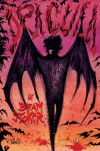Currently reading
The Last Picture Show (Mass Market)
Dracula
Ludwig Wittgenstein: The Duty of Genius
The Portrait of a Lady
Maigret et le marchand de vin
Le Rouge et le Noir
The Secret Agent: Centennial Editon
 I've been thinking some more about this book which is usually a good sign. I've also felt the urge to add to my review though to be honest my thoughts aren't particularly more organized than before. I guess reading some of the other reviews made me want to be more specific.
I've been thinking some more about this book which is usually a good sign. I've also felt the urge to add to my review though to be honest my thoughts aren't particularly more organized than before. I guess reading some of the other reviews made me want to be more specific.I guess the ending in particular is still troubling me. Basically the question seems to me to boil down to whether or not I find Winnie's murder of Verloc believable. It feels to me to be a little manufactured, as if Conrad wasn't quite sure how to wrap things up, or as if he felt the need for a dramatic act that could resolve the situation. I get that Verloc is being inhumane in the extreme about Stevie's death and his own guilt therein, as well as cruelly insensitive to Winnie's natural reactions to the news. I also get that Winnie has sacrificed so much for Stevie, including submitting to Verloc's affections, that Verloc's insensitivity is as a deal of explosives added to the bomb that's just been dropped on her. Still somehow I find myself hesitant to accept that this spells the necessary psychological conditions for her to commit murder even in the peremptory manner described.
On a side note, I think it is characteristic of Conrad that even at this time Verloc is not villainized. Even as we are shown the behaviors that we can clearly see as repugnant, Conrad simultaneously offers us a humanizing understanding of the fault that causes these behaviors. While we may still blame Verloc for the character flaw that has allowed him to take advantage of Winnie's self-sacrifice, by framing it as the simple vanity that he is loved for himself Conrad keeps Verloc well within the range of our comprehension and sympathy.
Returning to Winnie, it's also obvious that Verloc is displaying a positive genius for saying the wrong thing and pushing the wrong buttons. I also liked the way Conrad talks about her experiencing a sense of freedom that is then also frustrated by Verloc even at the same time that Winnie doesn't know what to do with or about this feeling. Again it's a testament to Conrad that he is able draw a more three dimensional portrait of her reaction. Clearly there's a sense that the situation keeps pushing her closer and closer to the edge and that as her most natural reaction of escape is frustrated she is left with no way to cope with the mounting insult heaped on her grievous injury.
I guess if I was going to frame what troubles me about the murder it would be that so much of what preceded it was tension kept below the surface. Even the bombing itself is treated indirectly and in some ways leaves us more with a sense of anticipation about what will happen rather than any sense of dramatic relief. This is especially true of Winnie herself who has kept herself strictly controlled. The sudden breakthrough of such a violent, dramatic, and straightforward action feels somewhat out of place and maybe even inadequate as a release of all the submerged tension.
On the other hand I think this exercise of writing my thoughts out on the matter has helped me understand that scene better. I'm still not wholly on board with it as an ending but I have a clearer sense of what it is going on there as well as of what it is that troubles me about it.
--------------------------------
I liked reading this but the ending left me dissatisfied.
The style was intriguing. That is it took some effort to read. As far as I am concerned this was a good thing in that the writing had real substance. The characters and situations were drawn with both detail and the tension of interest. At times it reminded me of Dickens. I will say though that one thing that seemed to make comprehension difficult at times was the use of the present tense without much regard to the order of events either in general or in respect to matters just discussed.
As far as mystery goes, it wasn't very mysterious. Most of the tension comes from wondering how the various characters will handle situations and the bombing attempt in particular. This tension is for the most part plenty to sustain interest though.
I thought the portrayal of the revolutionary types was interesting and nailed some counter-cultural types I've met and even been myself. The tone is sort of conservative in that regard but certainly not unreflectively so.
As far as the ending goes I'm not totally clear what bothered me about it. Maybe that no one gets off. That is all of my sympathies seemed to be frustrated. So on the one hand maybe I am just dissatisfied with the lack of a conventional ending, not necessarily a happy one, but one with poetic justice. On the other hand the whirlwind of destruction doesn't seem that believable either.









